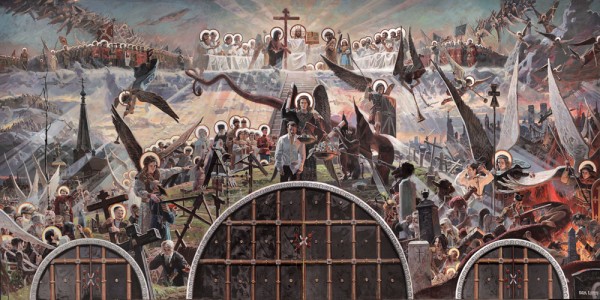At the moment of death, the soul leaves the body and enters into a new realm of existence, although it does not lose either its memory or the ability to think and feel. Moreover, the soul goes to another world burdened by the weight of responsibility for the life it has lived, carrying within itself the memory thereof.
The Christian doctrine of the Dread Judgment that awaits all men following their death is based on the fact that all the good and evil deeds performed by man leave traces in the soul, and everything must be answered for before the Absolute Good besides which no evil or sin can exist.
The Kingdom of God is incompatible with sin: And there shall in no wise enter into it any thing that defileth, neither whatsoever worketh abomination, or makeith a lie: but they which are written in the Lamb’s book of life, the Holy Apostle and Evangelist John the Theologian says in the Book of Revelation [21:27]. Every evil for which man has not repented with all sincerity at Confession, every secret sin, every impurity of soul – all will be revealed at the Dread Judgment: For there is nothing hid, which shall not be manifested; neither was any thing kept secret, but that it should come abroad, says Christ [Mark 4:22].
They already knew of the Dread Judgment in the Old Testament. Ecclesiastes says: Rejoice, O young man, in thy youth, and let thy heart cheer thee in the days of thy youth, and walk in the ways of thy heart, and in the sight of thy eyes: but know thou, that for all these things God will bring thee into judgement [11:9]. But Christ Himself speaks of this with particular clarity: When the Son of man shall come in His glory, and all the holy angels with Him, then shall He sit upon the throne of His glory: And before Him shall be gathered all nations: and He shall separate them one from another, as a shepherd divideth his sheep from the goats: And He shall set the sheep on His right hand, but the goats on the left.
Then shall the King say unto them on His right hand, Come, ye blessed of My Father, inherit the Kingdom prepared for you from the foundation of the world: For I was an hungred, and ye gave Me meat: I was thirsty, and ye gave Me drink: I was a stranger, and ye took Me in: Naked, and ye clothed Me: I was sick, and ye visited Me: I was in prison, and ye came unto Me. Then shall the righteous answer Him, saying, Lord, when saw we Thee an hungred, and fed Thee? or thirsty, and gave Thee drink?…
And the King shall answer and say unto them, Verily I say unto you, Inasmuch as ye have done it unto one of the least of these My brethren, ye have done it unto Me. Then shall he say also unto them on the left hand, Depart from Me, ye cursed, into everlasting fire, prepared for the devil and his angels: For I was an hungred, and ye gave Me no meat: I was thirsty, and ye gave me no drink… And these shall go away into everlasting punishment: but the righteous into life eternal [Matthew 25: 31-37; 40-42; 46].
Christ’s words show that the Dread Judgment shall be for many a moment of revelation: those who were certain of their salvation shall of a sudden be condemned; while those who, perhaps, had not encountered Christ in their earthly life (When saw we Thee? [Matthew 25:38]), but were merciful to their neighbors, will be saved. In the parable of the Dread Judgment, the King does not ask people whether they went to church, kept the fasts, or prayed at length; rather, they are asked how they treated their neighbors, His “younger brethren.”
Acts of mercy, performed or not performed by man in life, are the main criteria at the Judgment. The Dread Judgment will be conducted over all people: both believers, and non-believers; both Christians and pagans. But if Christians will be judged according to the Gospel, pagans will be judged according to the law written in their hearts, their conscience also bearing witness (Romans 2:15).
Tranlsated from the Russian.




















